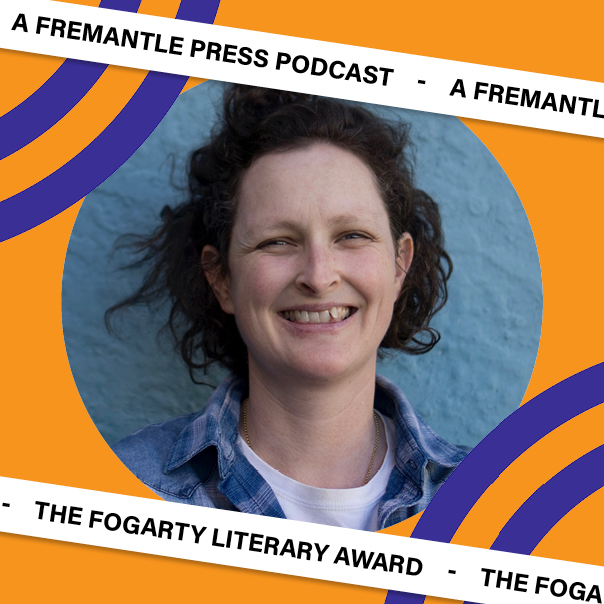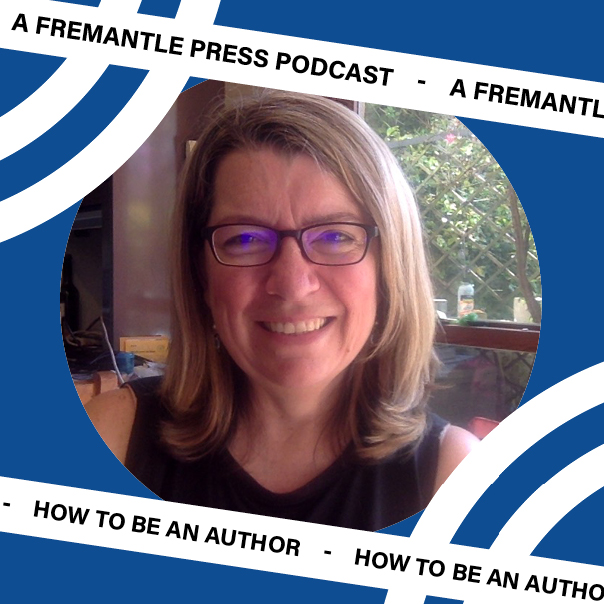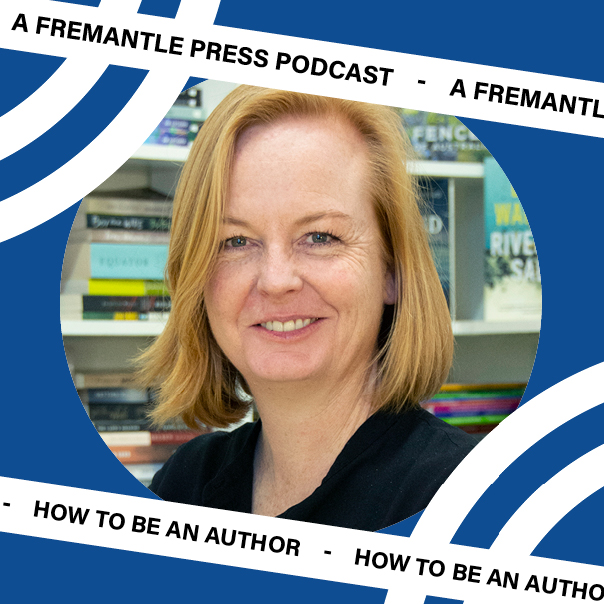Speaker 1 00:00:09 The Freeman Press podcast is recorded in wk on NoJa, and we offer our respects to Noar elders past, present, and emerging.
Speaker 1 00:00:18 Welcome to the Manor Press podcast, fogie Literary Award special edition. My name's Georgia Richter, publisher and Judge of the Fogarty, along with publisher Kate Sutherland and author Brooke Tennell. We are here to introduce the Fogarty Literary Award shortlist in a moment, 2021 Fogie Literary Award winner Brooke Tennell, whose author of the Glasshouse will interview Patrick Mare about their manuscript knock loose. But first I'd like to tell you a bit about why I love their work. Patrick Mare is a writer, comedian, journalist, critic, musician based in Wola, Freemantle and WA Puja. They've been published in many national, international publications and their novel, A horse held at gunpoint was shortlisted in the 2021 Fog Literary Award. Their novel Knock Loose begins with a tragic fire that rips through the southwest town of Bodkins Point. But this tragedy is really just a way of unleashing the hounds of mayhem in a town that, since it was established, has featured every year a bloody medieval festival in which participants may or may not lose their dignity body parts or even their lives. One of the central characters of this novel is Joy and she has lost her granddaughter in the fire. Joy is a former champion Archer and stunt woman and says she's really equipped to reap vengeance on her own. I absolutely love Patrick's novel for its comic timing. It's anime stylings, it's cartoon violence and the way that it made me laugh out loud, the thing is, I reckon you can only write about mayhem if you do it with control, and Patrick is very much in control of their material.
Speaker 1 00:02:03 Let's hear Brooke Danel talking with Patrick Marlborough.
Speaker 2 00:02:09 So Patrick, welcome to the podcast.
Speaker 3 00:02:11 Thanks for having me.
Speaker 2 00:02:12 It's great to see you. We're here today to talk about your manuscript Knock Loose. So can you tell our listeners a little bit about the story?
Speaker 3 00:02:21 Knock Loose is about a retired former Olympic archer and gold medalist and our stunt woman who, uh, whose granddaughter is killed in a bushfire that she slowly works out was arson. And she goes on a bloody quest of revenge, but it is set within a small country town that every year for the last 120 or so years has thrown a militantly insane medieval reenactment festival that has its own law, meta-story and meta fiction that is incredibly intense. And sue,
Speaker 2 00:03:00 Anything else to say about it? Cuz Yeah, there's so much to it.
Speaker 3 00:03:03 There's a <laugh>, there's a lot of elements. Um, when I first started to write it, I had the idea about five years ago when I went to banging out Medieval festival to, uh, write about of advice. Um, and I took a lot of photos there and I particularly love these photos I have of like bogan bmx, like Mongos BMX shirt guys, smoking diaries and wearing speed deals, but dressed in Fortnite armor and like, and something about that image just really stuck in my head and I watched the mes of like these little kids really going at it and it was a very misty muddy day. So it'd actually looked very gothic and like kind of over top. That story came to combine with this revenge thriller one really only when I started writing the book, which was not very long ago, basically I wanted to write a script for a revenge thriller starring Magnus Saban <laugh>, um, like a Charles Bronson Death Wish type movie. And I was like, I'm gonna write a revenge movie, but with Magnus Saban in delayed, like a John Wick type film. And I had the image of like these knight on the back of a ute firing, blaming arrows into the bush. And that's about all I had in my head for about five years. And, and then when I started writing, it really just spilled out of me. Mm-hmm.
Speaker 2 00:04:07 <affirmative>. Yeah, I think when you, um, when you read the extract next that readers will be able to picture the Magda Zinsky character and those kind of like <laugh> um, yeah. The, the guys with the arrows, like you've said, I think that really comes to life.
Speaker 3 00:04:20 Yeah, sure. Um, this is from one of the early chapters. It's kind of the first part that really starts to get into detail about Asian court, which is the festival they put on every year. Mm-hmm. <affirmative>, where I think the reader suddenly realizes that maybe it's a bit bigger in scope and a bit more intense than the kind of illusions to it so far have suggested. Uh, and it's about how the protagonist Joy first picked up a bow and arrow cause she was a child, uh, bow and arrow proje and her dead beat alcoholic cult maned father who was a carie was also the festival's most beloved Bandit. So it's kinda an introduction to that. Essentially
Speaker 2 00:04:58 Great
Speaker 3 00:04:59 Joy had first picked up a bow, age six at Asian Court, 1964. Then the 95th consecutive Asian court to date Asian court was Bodkins point's pride. It's everything. The gun. In 1869, a year after the town settlement, Asian court was conceived, hosted, funded, and fought in by the town's wealthy, quasi mythic Captain Bodkin, the first of his name, a catlan claimed his own ancestors had fought and died gallantly at the Asian Court of legend. And that the blood of Great Knights ran through his veins, what you could generally call an eccentric captain. Bodkin spent a small fortune on the festival, benmore of a tournament each year shipping antique armor and weaponry from around the world to the little town he built in the bush on the back of its timber, tin and apples, all of which he owned the majority stake in at the first reenactment.
Speaker 3 00:05:43 He armed the towns men and boys, divided them into French and English armies and have them go at it on Bodkin Hill, a large slope ending in a flat at the back of his quickly growing estate, a soldier and a policeman. Before he was a land Barron, captain Bodkin drilled the town as if he were an exiled king, raising a rebel army, training the timber workers shear as Tim Smiths pub owners, apple farmers and drunks and the ar, sugary and Salman ship with owing titles, Siegels and Ry on the larger families and nine men who pronounce Asian court with a hard as if he'd hoped they'd passed the mispronunciation down their line for as long as the town stood, the town spoke met this good humory at first indulging the famous captain's whims and thuggish fancies under the mistaken belief that this was a one-off carnival of fun.
Speaker 3 00:06:24 Held to ring in the town's first year officially on the map. But good humor turned to intergenerational fumes where Captain Bodkin insisted they fight with intent to kill just intent. Mind you, nothing rougher than the drunken 40 matches they played against the neighboring towns. A touch of maing or crippling here and there, the odd death being an non unfortunate, if not unforeseen consequence. The inaugural Asian court left five dead and three seriously wounded with the town's doctor losing a hand and having his ability to mend the bust and broken severely inhibited. But news of the then weekend are spread to neighboring towns through Bridgetown and Donnybrook and Bustleton until the Fable snake that sw up to Perth to become talk of the city. A punchline and a curiosity in a place that was determin in curious the ranks of the French and English army swelled over the following years. And Captain Boken, who they'd crowned the Captain King, would wade into the muddy me on the back of his aging Warhol swinging his saber at big city lawyer's, accountants newspaper, then the engineers, dock workers Shipwrights bombs journalists and rubberneckers or charging them with his homemade eucalypt lance to which he'd attached his army bayonet the money from the events swell, the town's coffers and Bodkins point seemed shielded from the economics ups and downs of buffered neighboring towns throughout the years, thanks to the interest in their whole unique tradition and the Mad Man who hemmed it
Speaker 2 00:07:38 <laugh>. Thank you. That was really good. And that's a really, um, good backstory for what's gonna happen in this, um, the AOR that is the subject of the manuscript. Your novel combines some really big human emotions like grief and that revenge story you were talking about before the Magda Zinsky revenge story. Um, but there's also these really hilarious slapstick scenes going on. So I was wondering how did, um, the anime that's also in the manuscript, if we haven't mentioned that yet, but also your sense of what makes good comedy. How did those things kind of influence the way you balance those elements in the book?
Speaker 3 00:08:18 Since about the age of like 12, I've had this deep desire to combine, um, loony Tunes, buds Bunny with like James Joyce. That's kind of been what I've been working towards as a writer of my entire life. Mm-hmm. <affirmative>, uh, this book is pretty close <laugh>. Um, uh, and, uh, I I find it funny, like, yeah, my last book that got shortlisted was also kind of about a suicide and people's grief around that to a degree, but was a slapstick screwball comedy essentially. And I find that kind of grief almost as a mechanic, a very good way to actually like hang jokes and scenarios as Bob was on. Um, I think when I started writing this, like I said, my original intention was a lot more focused and a lot more grounded. I thought it was gonna be like a realistic revenge thriller to a degree.
Speaker 3 00:09:07 And the Asian court stuff almost came out of nowhere and just like squealed exponentially and all the little details and all the characters and as it got silly and silly, I kind of liked that side of it more and more. And to me, like as someone who loves satire and like poking front of stories and poking front of characters and cliches, like you've got people who are in the book living out cliches and stories and characters that they've almost been forced to do. And some of them are in different, like, uh, the current mayor of King or whatever of the town, some of them are way too into it. Uh, and it creates this like funny tension of like the fluidity of like narratives and consistency and reality that me, I think grief and comedy are two things that intersect very well, uh, in that kind of situation.
Speaker 3 00:09:57 Um, as for anime, uh, I'm a relatively new week. I say that. I dunno how true that is. <laugh>. Uh, I'm hardcore one five years. Uh, and I I read a lot of like literary leaning man, I guess. I don't know. Uh, Talia Maximoto is an author I really, uh, respect and love, uh, and, uh, <inaudible> and Na Tomo and their ability to create like relatively grounded and wholly realized. And I think for me was like really interesting is like, like I'm more interested in voice than anything else in style and very consistent and distinct. The book is really about stories and myths and the the lies we tell ourselves. And you know, the man gran anime one almost runs counter to the, uh, medieval fantasy one that the, the town has lost it, uh, <laugh>. I see. So yeah, it allows what kind of cartoon logic <laugh>.
Speaker 2 00:10:49 Yeah. I think it's interesting that you said that you had the idea for the Asian Court part five years ago going, going to that festival and then, but also you've been into anime for five years. So do you feel like they've kind of grown to get or they've been running parallel or something like that?
Speaker 3 00:11:08 Look, I'm on the spectrum and I'm, I'm a huge nerd for a lot of things. I absorb a lot of media and a lot of genres I guess. And as a child I was a big fantasy nerd. I was a big nerd and I played War Hammer and played a lot of C RPGs, like Bow's Gate. They were really like things I haven't really been into since I was about 13, but they have permanently etched in my brain. And same with anime, which I guess I've been watching since I was six. Choose TV and these things, you know, they're not separate from my like, love of like kind of difficult literature, which I've been into since I was 10 or whatever. <laugh>. Yeah. So it's all very, um, it's all very intermingled and I think it's that thing of fantasy, I guess at the end of the day of on reality. And people, I think now more than ever, have a strong disturbing desire to live in fiction. And the only character in the book that never really embraces it wholeheartedly is a protagonist who's fairly indifferent to the whole thing. They, they run on similar logics, they allow the same kind of bullshit and if you like, making fun of things, boy do they have a lot of things that you can make fun of. So <laugh> leave themselves wide open.
Speaker 2 00:12:20 So they were like meant to be, they were always gonna be entwined with each other cause they've got that same logic like you said.
Speaker 3 00:12:27 But I mean, I don't meant to harp on about it, but I, I do love the tension of like, I think fantasy, the kind of fantasy and historical stuff I'm making fun of is relatively well known to a certain kind of, you know, normal quote unquote person. Whereas, you know, this country town's fear of the new and like it is kind of represented by manger and anime, which the, the book's, uh, Aboriginal character who's like a contemporary artist who's a huge anime and man nerd and that's another thing that really bothers him in a town that's has weird but strict traditions. I mean, my favorite chapter in the book is when they have the the town council meeting and they're trying to, they can never decide on the vibe or the tone or the consistency and what's allowed <laugh>, if you can dress up as an elf or whatever <laugh>
Speaker 2 00:13:12 Yeah. There's like laws that they decide that you know, oh no, this every, this is agen and this is not agen kind of thing.
Speaker 3 00:13:21 It was very important to me that it was not consistent. That's like a really key part of it because I, big part of it is satirizing Australian self narratives of mythmaking and I think we're a very inconsistent and kinda hypocritical country and I love that the town can never decide what the tone or what the vibe is and nobody really knows. Mm. Some people are terrifyingly hardcore like the captain and some people are largely indifferent, so.
Speaker 2 00:13:46 And so just, um, just as a final question for our, um, for our chat this afternoon. You, you mentioned before that your previous, um, shortlisted manuscript, which was in the Fogarty Award two years ago. And so what does it mean for you to be shortlisted again for the Fogarty Literary Award this year?
Speaker 3 00:14:05 Well, um, how can I be, uh, <laugh>, uh, look as a 33 year old, uh, yeah. Autistic person who was like living with my parents and was like essentially unemployed, just like the idea of, uh, $20,000, uh, makes me salivate, unfortunately <laugh>. But, uh, it has been kinda my dream since I was small to do nothing but write and publish novel. And I think the thing I've been like kind of desperate for and begging for, like my whole life is just like a commission to be able to do it. Cause I'm a real, uh, once I get my foot, foot in the door kind of guy, uh, they can't get me out. But I have so many more books in me, so I think it's permission one of a better word to, to keep writing them and keep going, uh, even though I have a very distinct and very weird, um, <laugh>,
Speaker 2 00:15:00 But yet so many more manuscripts in that very distinct and weird style to come.
Speaker 3 00:15:06 Yeah. Yeah. I, I've got about 50 in me and I think about five are good, but, uh, <laugh> I'll write that anyway.
Speaker 2 00:15:13 Yeah, that's a good percentage, you know. Um, oh, that's really great. Well thank you so much for sharing that with us and thank you for, um, talking to me today and all the best for the award ceremony.
Speaker 3 00:15:25 Thank you. Thanks for having me.
Speaker 2 00:15:27 So I'll be hosting the 2023 Fogarty Literary Award. This is a free event that's taking place at the E C U Spiegel 10 on Thursday, the 25th of May, 2023. Tickets are available from the Freemantle Press
[email protected]. I'm Brooke Tennell and thank you so much for spending time with us today.


